Sleep Your Way to a Longer Life: The 2025 Guide to Better Rest and Longevity
Sleep isn’t just about feeling rested it’s one of the most powerful secrets to a longer life. Research shows that quality sleep is as essential to longevity as diet and exercise. While skimping on sleep might feel normal in today’s busy world, the science is clear: consistent, restful sleep is your body’s foundation for a longer, fuller life.
This post contains affiliate links. I may earn a commission at no extra cost to you.
After diving deep into sleep research and discovering how profoundly it impacts longevity, I’ve uncovered powerful insights that can transform your health. I’ll share how optimizing your sleep patterns could add quality years to your life, backed by cutting edge studies and real world evidence. In this guide, we’ll explore why quality sleep is crucial for a longer life and share practical tips you can start using tonight.
🌙 Quick Tip: Want to support better sleep naturally?
Thrive Market has everything you need for a peaceful bedtime from organic teas and adaptogens to natural sleep supplements.
👉 Get 30% off your first order here
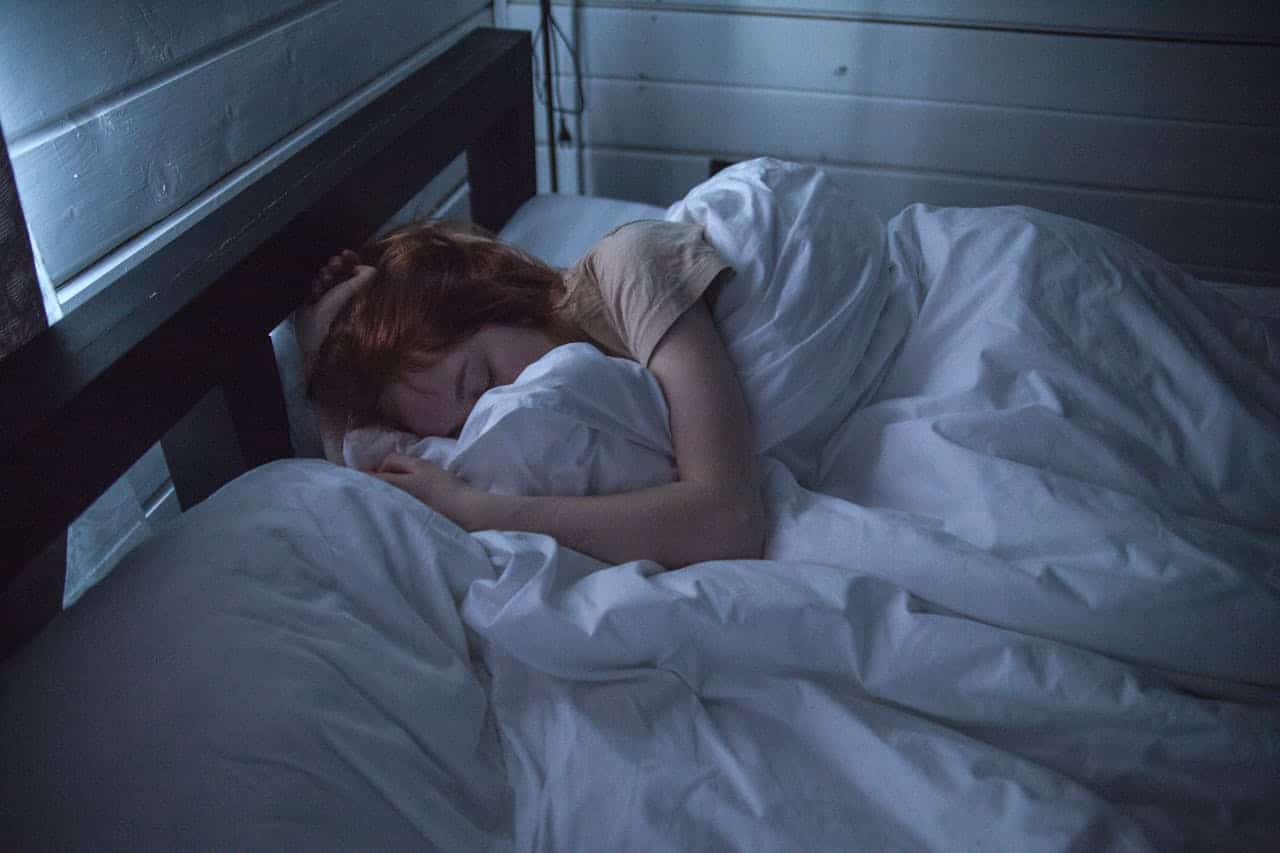
Why Sleep is Crucial for a Longer Life
You know those nights when you only get a few hours of sleep, and the next day feels like a foggy mess? Yeah, we’ve all been there. But sleep isn’t just about feeling rested. It’s when your body does its most important maintenance work. Think of it as your repair shop; skip too many “appointments,” and things start to break down.
The Role of Sleep in Cellular Repair and Regeneration
During deep sleep, your body goes into repair mode, fixing damage and replenishing energy. The slow-wave phase, also known as deep sleep, boosts the production of growth hormones, the “repair crew” responsible for healing tissues and even strengthening bones.
- Boosts cellular repair: Repairs tissues and regenerates cells after daily wear and tear.
- Supports recovery: Helps muscles and bones rebuild, especially after exercise.
- Fights aging: Keeps your body’s systems running efficiently, slowing signs of aging.
How Sleep Impacts the Immune System and Inflammation
Ever notice how you’re more likely to catch a cold after a few bad nights of sleep? Poor sleep weakens your immune system because your body produces fewer infection-fighting cytokines. It also increases inflammation, which can lead to long-term issues like heart disease and diabetes.
- Strengthens defenses: Good sleep boosts immune responses to fight off illness.
- Reduces inflammation: Helps lower chronic inflammation linked to aging and disease.
The Correlation Between Sleep Quality and Chronic Disease Prevention
Chronic sleep deprivation doesn’t just make you tired. It raises your risk for serious health problems. Poor sleep disrupts your blood pressure, blood sugar, and even hunger hormones like leptin and ghrelin, which control appetite. Studies show that sleeping less than six hours a night can increase your risk of conditions like obesity, heart disease, and Alzheimer’s.
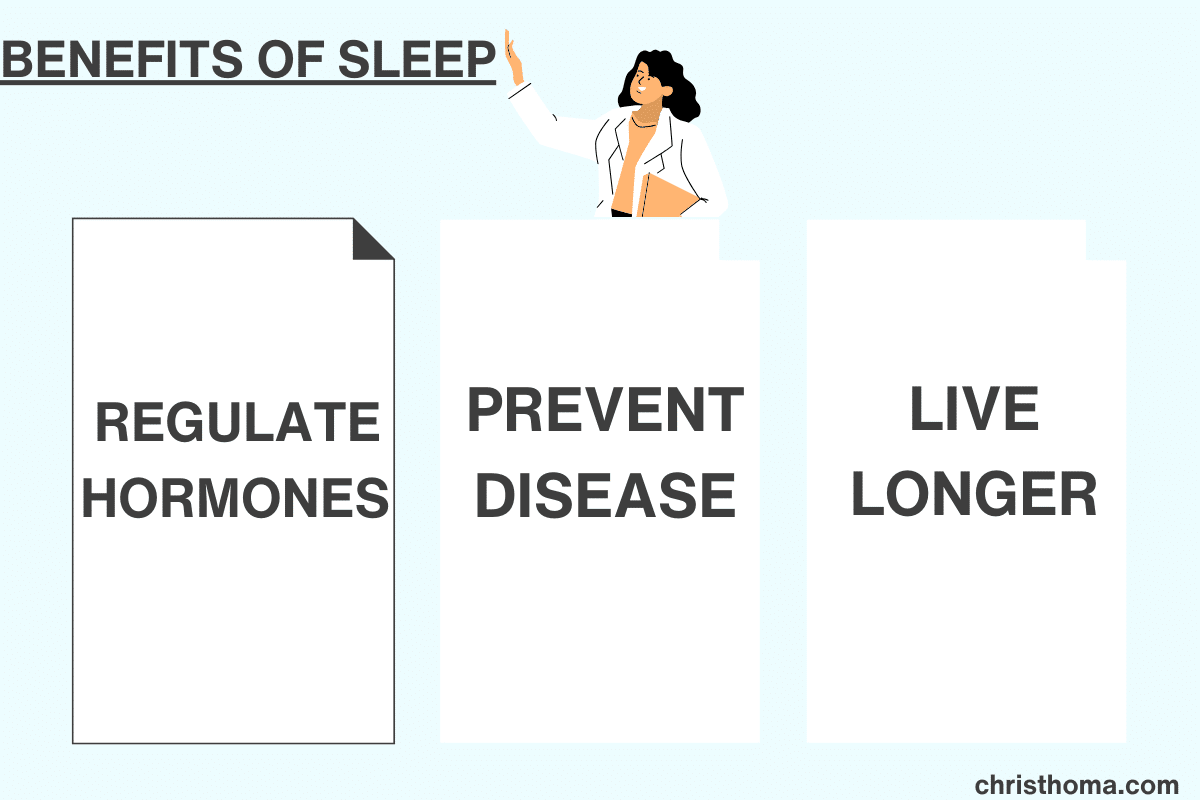
- Regulates hormones: Balances hunger and stress hormones.
- Prevents disease: Reduces risks of chronic conditions like diabetes and heart issues.
- Extends lifespan: Quality sleep is tied to a longer, healthier life.
The bottom line? Sleep isn’t just rest; it’s a long-term investment in your health. Prioritize those hours now, and you’ll thank yourself later.
The Science of Sleep and Aging
Ever wonder why some people seem to age gracefully while others feel like they’re racing against time? Sleep is one of the biggest secrets to staying youthful on a molecular level; it’s like hitting the “refresh” button every night. When we shortchange our sleep, though, we’re speeding up the aging process in ways most don’t even realize.
How Sleep Affects Aging at the Molecular Level
Here’s the fascinating part: your cells have their internal clocks, called circadian rhythms, that rely on quality sleep to stay in sync. During deep sleep, your body activates processes like DNA repair and toxin removal. Sleep also reduces oxidative stress, which can damage cells and accelerate aging.

- DNA repair: Sleep helps fix DNA damaged by everyday stress and environmental factors.
- Reduces oxidative stress: Lowers harmful molecules that cause cellular aging.
- Boosts skin health: Promotes collagen production for firmer, younger-looking skin.
When you skip sleep, these processes are disrupted, leaving cells more vulnerable to inside and out damage.
The Link Between Sleep Deprivation and Accelerated Aging
Sleep deprivation doesn’t just make you feel older; it ages you faster. Studies have found that people who regularly sleep less than six hours a night experience higher levels of inflammation and reduced telomere length. (Telomeres are like the protective caps on the ends of your DNA strands; when they shorten, your cells age.)
I remember reading about a study in which chronically sleep-deprived participants showed signs of biological aging equivalent to years of poor lifestyle habits. It’s no wonder people call sleep “the fountain of youth.”
- Shortened telomeres: Less sleep means faster cellular aging.
- Chronic inflammation: Increased inflammation accelerates age-related diseases.
- Weakened brain health: Poor sleep leads to cognitive decline and memory issues.
Studies on Sleep
Adults need 7-8 hours of quality sleep nightly. Poor sleep is linked to seven major causes of death, including heart disease, stroke, and diabetes. Beyond survival, good sleep supports your immune system, helps maintain a healthy weight, and protects brain function. Consider it as vital as proper nutrition and exercise for overall health and longevity.
The evidence is clear: good sleep habits can add years to your life. Deep sleep is linked to better memory and brain health in older adults, which helps stave off conditions like Alzheimer’s.
- Consistent schedules: Regular sleep patterns promote longevity.
- Deep sleep benefits: Linked to better brain health and disease prevention.
- Lifespan extension: Quality sleep reduces risks of life-shortening diseases.
The takeaway? Sleep isn’t just about feeling rested; it’s about physically and mentally aging well. If you want to stay sharp, look younger, and live longer, prioritize sleep. It’s one of the easiest (and cheapest!) anti-aging hacks out there.
Common Sleep Problems That Impact Longevity
If there’s one thing I’ve learned, sleep problems sneak up on you and don’t ruin your night. Over time, they can seriously chip away at your health and even shorten your life. From tossing and turning to struggling with more serious conditions, sleep problems are like hidden villains that mess with your body’s ability to heal, recharge, and stay young.
Insomnia: The Hidden Risk to Long-Term Health
I used to think insomnia was just a “bad night’s sleep.” But after experiencing weeks of restless nights during a stressful time, I realized it’s more than that. Insomnia disrupts your body’s natural repair processes, leaving you exhausted, irritable, and unproductive. The real kicker? Chronic insomnia has been linked to increased risks of heart disease, diabetes, and even depression.

- Hormonal chaos: Insomnia throws off your cortisol levels, which impacts stress and metabolism.
- Chronic fatigue: Long-term insomnia reduces your energy reserves, overwhelming everyday tasks.
- Disease risk: Linked to higher chances of cardiovascular issues and metabolic disorders.
The good news is that there are solutions, like creating a consistent bedtime routine or trying mindfulness techniques. It’s not easy, but even small changes can help.
Sleep Apnea and Its Effects on Heart and Brain Health
Sleep apnea is one of those sleep disorders that doesn’t just affect you. It impacts everyone around you (hello, snoring). But the real danger isn’t just noise. It’s how sleep apnea disrupts oxygen flow to your brain and heart throughout the night. Untreated, it can lead to high blood pressure, stroke, and cognitive decline.
I have a friend who used to wake up gasping for air without realizing it was sleep apnea. Once he got a proper diagnosis and started using a CPAP machine, his energy levels skyrocketed, and his blood pressure stabilized.
- Heart health risks: Sleep apnea increases the chances of heart attacks and arrhythmias.
- Brain fog: Oxygen deprivation can lead to memory loss and concentration issues.
- Daytime fatigue: Poor sleep quality leaves you drowsy and less alert during the day.
If you think sleep apnea might be an issue, don’t ignore it. Talk to a doctor. A diagnosis could save your life.
Stress-Induced Sleep Issues and Their Aging Effects
Have you ever laid in bed, staring at the ceiling, replaying every awkward thing you’ve said? Yeah, that’s stress messing with your sleep. Stress-induced sleep problems, like difficulty falling or staying asleep, don’t just make you tired. They accelerate aging by increasing inflammation and cortisol levels.
When I started journaling before bed, it was a game changer. Writing down my thoughts helped clear my mind, and my sleep improved almost immediately. It’s a simple habit, but it works wonders.
- Inflammation spike: Stress-related sleep problems lead to chronic inflammation.
- Hormonal imbalance: Elevated cortisol disrupts sleep cycles and speeds up aging.
- Mental strain: Poor sleep amplifies anxiety and makes stress more challenging to manage.
The bottom line? Sleep problems aren’t just annoying. They directly threaten your longevity. Whether it’s insomnia, sleep apnea, or stress-induced issues, addressing them head-on can transform your nights and overall health. Prioritize your sleep. It’s one of the best gifts you can give yourself.
The Connection Between Sleep, Fitness, and Longevity
If you’ve ever hit the gym after a rough night of sleep, you know how much it impacts your performance. You’re sluggish, your strength feels off, and even simple exercises seem harder. But here’s the flip side: when you pair good sleep with consistent fitness, the benefits stack up in a way that boosts your workouts and helps you live longer and healthier. Sleep and fitness are like two sides of the same coin. They feed into each other to keep you feeling unstoppable.
How Exercise Improves Sleep Quality and Duration
One of the best things about exercise is that it tires you out in the best way possible. Studies show that regular physical activity, especially aerobic exercise, can help you fall asleep faster, stay asleep longer, and spend more time in the deep, restorative stages of sleep. I noticed this firsthand when I started running regularly; I felt more energetic during the day, and my nights became blissfully uninterrupted.
- Better sleep cycles: Exercise promotes deeper sleep, improving recovery.
- Stress relief: Physical activity lowers stress hormones, making unwinding easier.
- Faster sleep onset: Regular workouts help you fall asleep quicker.
Just don’t overdo it too close to bedtime. Intense workouts can leave you wired rather than tired.
The Best Times to Work Out for Better Sleep and Recovery
Timing is everything when it comes to working out and sleeping. Morning or early afternoon workouts are ideal because they help regulate your circadian rhythm (internal clock) by boosting daytime alertness. I used to hit the gym late at night, but I’d end up staring at the ceiling for hours. Switching to earlier workouts made a huge difference in my sleep and overall energy levels.
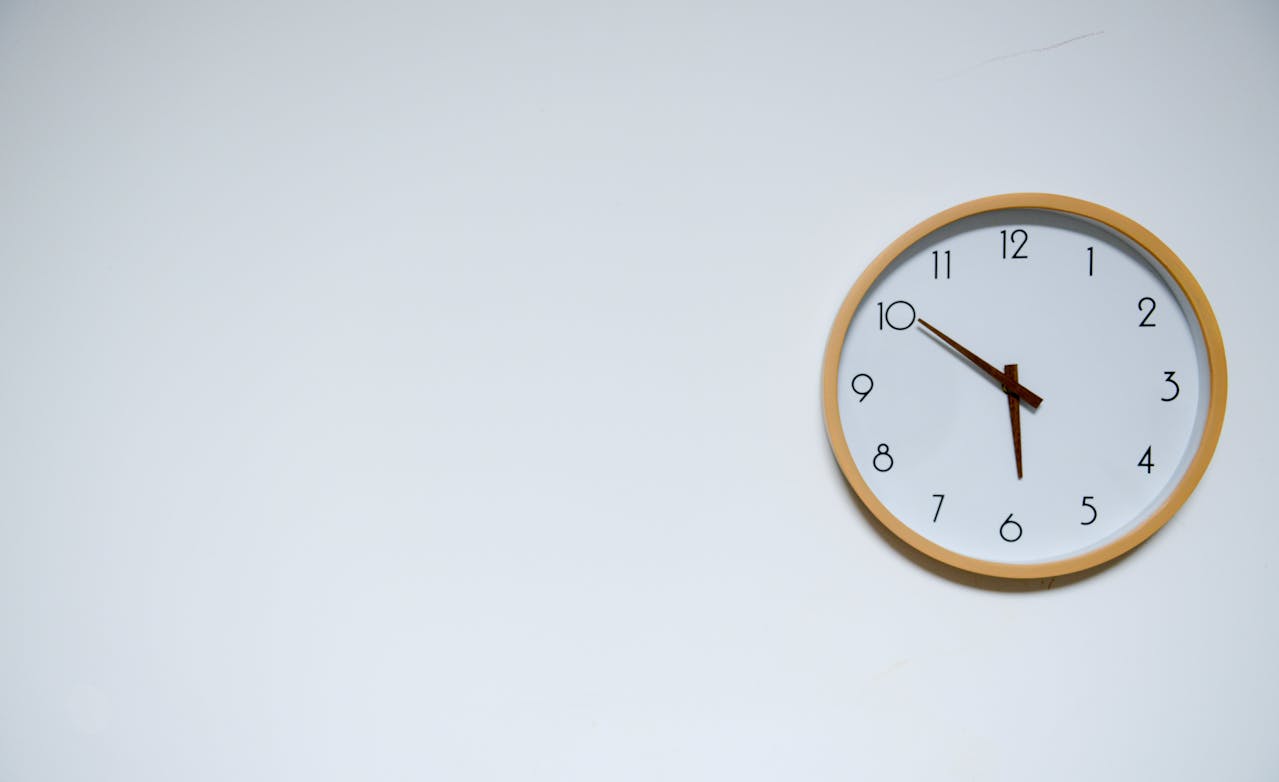
- Morning workouts: Best for syncing your body’s clock and promoting better sleep at night.
- Afternoon workouts: Great for boosting energy without disrupting sleep cycles.
- Avoid late-night sessions: High-intensity exercise within 2-3 hours of bed can interfere with sleep.
If evenings are your only option, stick to lighter activities like yoga or stretching to relax your body.
Sleep’s Role in Muscle Recovery and Overall Vitality
Here’s the thing: your muscles don’t grow during your workouts; they grow while you sleep. Deep sleep is when your body produces the most growth hormone, critical for repairing muscle tissue, replenishing energy stores, and reducing inflammation. Without enough rest, your recovery slows down, and your injury risk increases.
I found out the hard way when I pushed myself too hard at the gym without getting enough sleep. My progress stalled, and I started feeling constantly sore. When I finally made sleep a priority, everything changed. My workouts improved, and I felt stronger and more energized.
- Muscle repair: Deep sleep boosts growth hormone levels for tissue repair.
- Reduced inflammation: Quality sleep minimizes post-workout soreness and stiffness.
- Enhanced vitality: Better recovery means more consistent energy and performance.
The takeaway? Fitness and sleep are a dream team for longevity. Prioritize both, and you’ll crush your workouts and set yourself up for a longer, healthier life. So, hit the gym, get those Z’s, and watch your body thrive.
Essential Sleep Habits for Beginners
Building a foundation for quality sleep starts with simple, beginner-friendly habits. These strategies are perfect for anyone looking to improve their sleep without feeling overwhelmed.
Setting a Consistent Sleep Schedule
A consistent sleep schedule trains your body to fall asleep and wake up more naturally, improving overall sleep quality.
Starting with Small Adjustments to Bedtime:
If your sleep schedule is all over the place, don’t try to fix it overnight. Instead, adjust your bedtime by 15-minute increments each night until you hit your ideal bedtime.
Maintaining Sleep Times on Weekends:
It’s tempting to sleep in on weekends, but this can throw off your circadian rhythm. Aim to wake up within an hour of your usual time, even on your days off.
Optimizing Your Sleep Environment
Your bedroom should be a sanctuary for sleep. A few simple changes can make it the perfect environment for restful nights.

Finding Your Ideal Room Temperature:
Most people sleep best in a cool room, around 60-67°F (15-19°C). Experiment to find what works best for you.
Using Blackout Curtains and White Noise:
Eliminate distractions like streetlights or noisy neighbors with blackout curtains and white noise machines or apps.
Choosing the Right Mattress and Pillows:
Comfort matters! Invest in a mattress and pillows that support your sleeping position and keep you comfortable all night.
Simple Diet Changes for Better Sleep
Your eating habits can significantly impact how well you sleep. These small tweaks can make a big difference.
💡 Shopping Tip: I get my sleep-supporting essentials like chamomile tea, magnesium supplements, and calming adaptogenic herbs from Thrive Market at wholesale prices.
Timing Your Last Meal and Drinks:
Avoid heavy meals and caffeine at least 2-3 hours before bedtime to prevent disruptions to your sleep.
Foods That Help and Hinder Sleep:
Include sleep-promoting foods like bananas, almonds, and chamomile tea in your evening routine. Avoid spicy or greasy foods that may cause discomfort.
Managing Caffeine and Alcohol Intake

Caffeine and alcohol might seem harmless, but they can mess with your sleep.
Caffeine, found in coffee, tea, and energy drinks, gives you energy by tricking your brain into feeling awake. It can stay in your system for up to 8 hours, so try to avoid it in the afternoon.
Alcohol might help you fall asleep quickly, but it disrupts the deep, restorative sleep your body needs. It can also cause you to wake up during the night. For better sleep, skip alcohol a few hours before bed.
Quick Bedtime Routine Basics
A simple bedtime routine signals your body that it’s time to wind down for the night.
30-Minute Wind-Down Activities:
Engage in relaxing activities like reading, stretching, or listening to soothing music during the half-hour before bed.
Personal Hygiene Habits That Promote Sleep:
Brushing your teeth, washing your face, or taking a warm shower can help you relax and transition into sleep mode.
Creating a Relaxing Bedroom Atmosphere:
Dim the lights, light a candle, or use calming scents like lavender to make your bedroom feel like a cozy retreat.
Common Mistakes to Avoid
Even well-meaning habits can sabotage your sleep. Here are a few common pitfalls to watch out for:
Napping Too Late in the Day:
While naps can be restorative, napping late in the afternoon may make it harder to fall asleep at night. Stick to naps earlier in the day, lasting 20-30 minutes.
Using Your Bed for Non-Sleep Activities:
Your bed should be reserved for sleep (and intimacy). Using it for work, eating, or watching TV can make it harder for your brain to associate it with rest.
Forcing Sleep When You’re Not Tired:
Lying in bed wide awake can lead to frustration. If you can’t sleep, get up and do a calming activity until you feel sleepy.
Mindfulness and Relaxation Techniques for Better Sleep
Have you ever climbed into bed, hoping for a good night’s sleep, only to have your mind start racing with everything you didn’t do or, worse, things that don’t even matter? It’s frustrating. That’s where mindfulness and relaxation techniques can save the day (or night, in this case).
Incorporating even a few small practices before bed can help you let go of the day’s stress and ease into restful sleep. Trust me, I’ve tried it all. These are the ones that actually work.
🫖 Wellness Tip: Create your relaxing bedtime ritual with organic teas and natural aromatherapy from Thrive Market.
Using Meditation to Wind Down at Night
Meditation is a game-changer for quieting a busy mind. I used to think meditation was all about sitting cross-legged and chanting “Om,” but it’s way simpler than that. At night, I like to do a quick 5-10 minute mindfulness meditation, focusing on my breath or a calming mantra like “I am at peace.” This helps me let go of lingering thoughts and prep my mind for rest. The best part? It works even if you’re a total beginner.
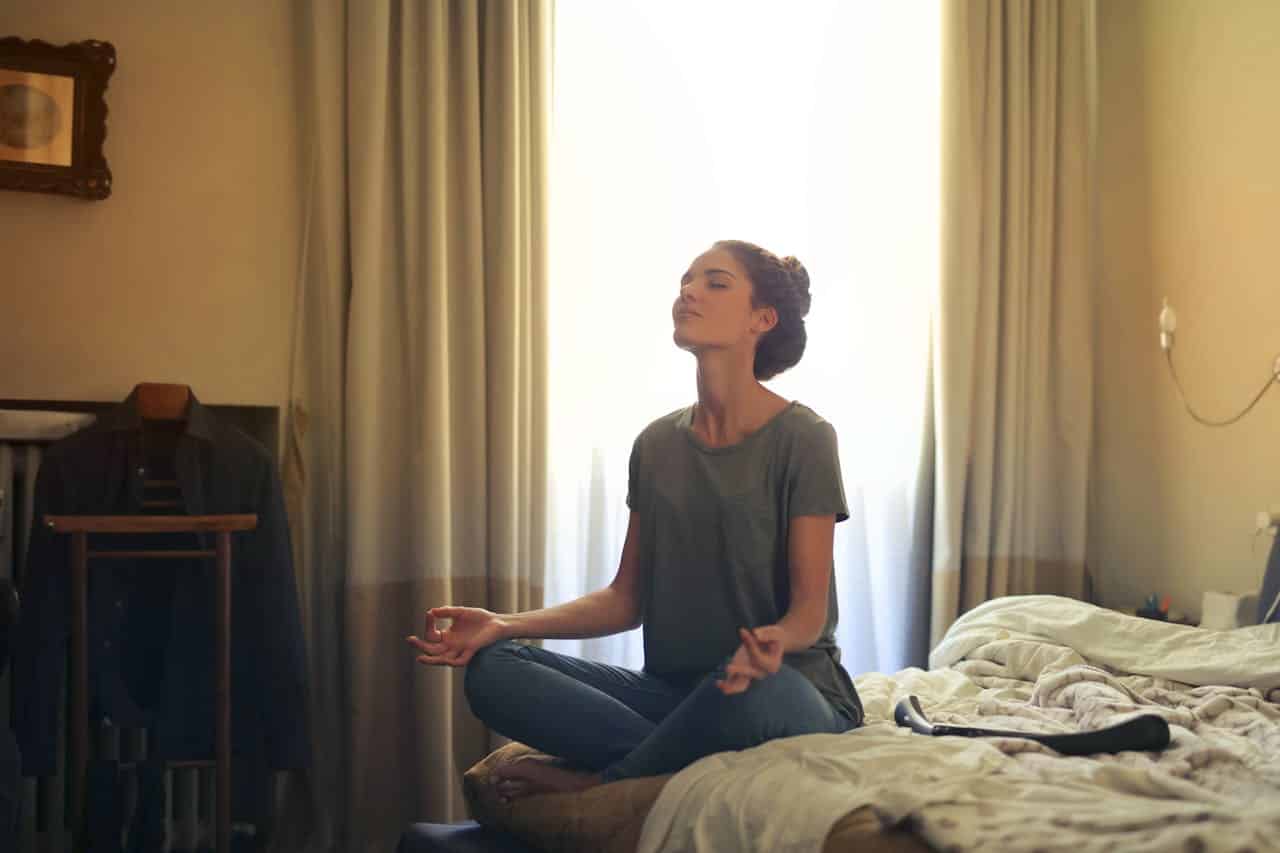
- Clears mental clutter: Helps stop overthinking and racing thoughts.
- Promotes relaxation: Activates your parasympathetic nervous system for better sleep.
- Easy to start: Apps like Calm or Headspace can guide you through simple meditations.
If you’re not into apps, focus on your breath, inhale deeply, exhale slowly, and let your mind settle.
Breathing Exercises That Promote Relaxation and Deep Sleep
Breathing exercises are my secret weapon when I’m feeling tense before bed. One of my favorites is the 4-7-8 method: inhale for 4 seconds, hold for 7, and exhale for 8. It might sound simple, but it works wonders for calming your nervous system. I’ve fallen asleep mid-exhale more times than I can count.
- 4-7-8 method: Slows your heart rate and promotes relaxation.
- Box breathing: Inhale, hold, exhale, and hold again, each for 4 seconds.
- Progressive relaxation: Pair deep breaths with relaxing each muscle group in your body.
These techniques are beneficial for dealing with stress or anxiety; just a few minutes can make a big difference.
The Role of Gratitude and Journaling in Reducing Sleep-Related Stress
This might sound cheesy, but ending your day with gratitude can completely shift your mindset. I started keeping a small journal by my bed and writing down three things I’m grateful for every night. It’s incredible how much lighter and more optimistic I feel afterward. Journaling also helps me brain-dump anything bugging me so it doesn’t keep me up.
- Gratitude practice: Shifts focus away from stress to positive thoughts.
- Brain-dumping: Clears your mind by writing down worries or tasks for tomorrow.
- Positive sleep prep: Reflecting on the good parts of your day can help you relax.
The key to better sleep isn’t just turning off the lights. It’s turning off your mind. Meditation, breathing exercises, and gratitude journaling are simple, effective ways to wind down and prepare for restful sleep. Give one a try tonight. You might wake up feeling like a new person.
Tracking Your Sleep for Longevity
If you’ve ever woken up feeling tired even after eight hours in bed, you’ve probably wondered: what’s going on with my sleep? That’s where sleep tracking comes in. Sleep trackers and apps can help you understand how long you’re sleeping and how well you’re sleeping. Trust me, when I started tracking my sleep, it felt like unlocking a cheat code for better energy and health.
Benefits of Using Sleep Trackers and Apps
Sleep trackers aren’t just fancy gadgets; they’re tools that help you optimize one of the most critical parts of your day. I started with a simple app on my phone, and within a week, I realized I was spending way less time in deep sleep than I thought. That small insight helped me make tweaks that transformed my nights.
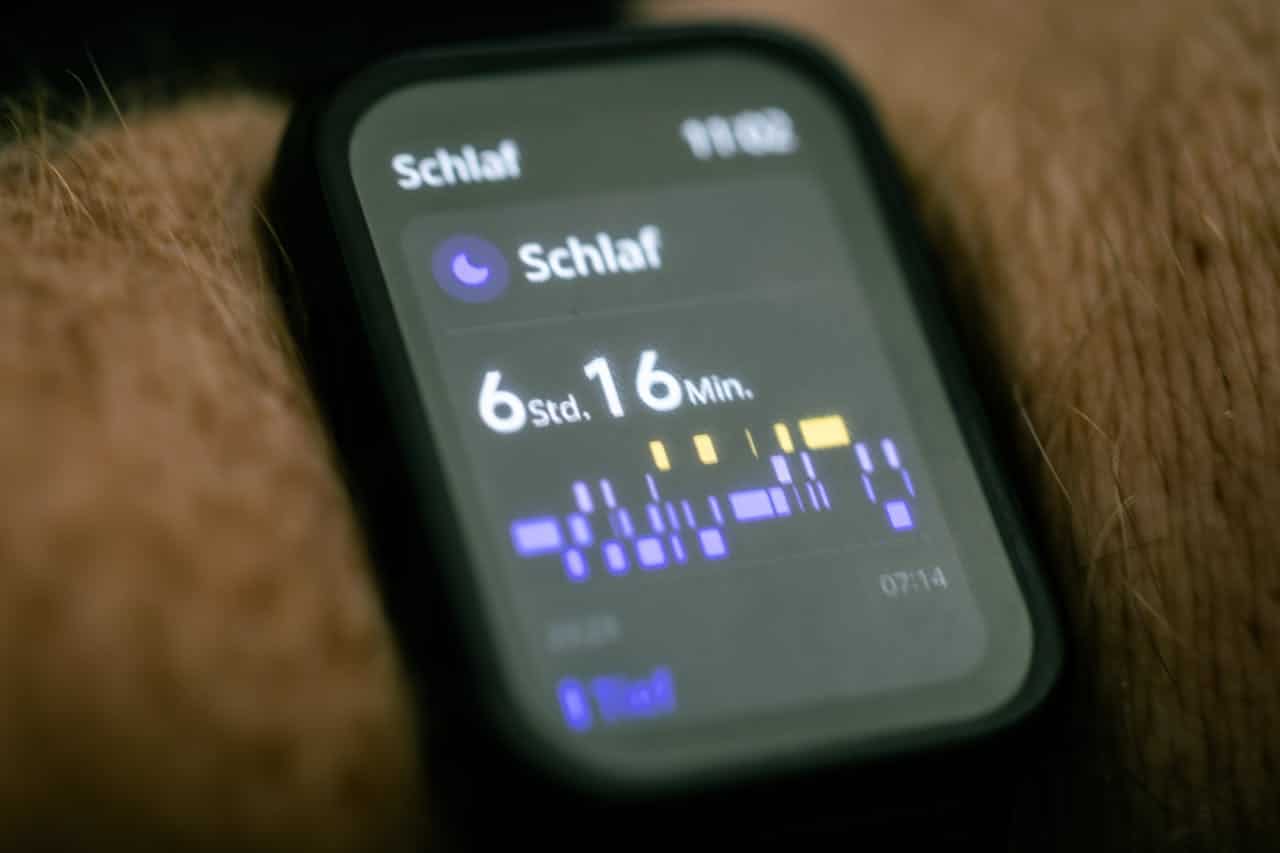
- Awareness: Sleep trackers show patterns you might not notice, like restless periods or inconsistent bedtimes.
- Optimization: Insights help you tweak your habits, like adjusting your bedtime or avoiding caffeine too late.
- Motivation: Seeing improvements over time can keep you on track with better sleep practices.
Some popular options include wearable devices like Fitbit or WHOOP and apps like Sleep Cycle or AutoSleep.
Key Sleep Metrics to Monitor: REM, Deep Sleep, and Sleep Efficiency
When I started tracking my sleep, I didn’t know what the numbers meant. But once I learned the key metrics, everything started to click. REM sleep is crucial for memory and emotional processing, while deep sleep is when your body does most of its recovery work. Sleep efficiency, on the other hand, measures how much time you actually spend sleeping rather than just lying in bed.
- REM Sleep: Aim for 20-25% of your sleep cycle, which is essential for brain health and emotional well-being.
- Deep Sleep: This restorative phase should make up 15-20% of your night for physical recovery.
- Sleep Efficiency: Ideally, you sleep 85-90% of the time in bed.
If your tracker shows that you’re not hitting these numbers, it might be time to adjust your habits, like improving your bedtime routine or cutting back on screens before bed.
Interpreting Sleep Data to Make Actionable Changes
The real magic of sleep tracking happens when you use the data to make meaningful changes. Seeing how late-night snacks cut into my deep sleep was a wake-up call (pun intended). I started eating dinner earlier and added a short evening wind-down routine, significantly boosting my sleep efficiency.
- Adjust your environment: If light or noise disrupts your sleep, consider blackout curtains or a white noise machine.
- Experiment with timing: Play around with your bedtime and wake-up time to find your sweet spot.
- Address habits: Reduce caffeine, reduce screen time, or try relaxing activities before bed.
Tracking your sleep might seem like a small step, but the benefits are enormous. Understanding your sleep patterns and making simple adjustments can boost your longevity and help you wake up feeling refreshed and ready to tackle life. So, why give it a try? A better night’s sleep might be just a few tweaks away.
Creating a Longevity-Focused Sleep Routine
You’re not alone if you’ve ever felt like your nights are a mess of scrolling, stress, and late-night snacks. But here’s the thing: a solid sleep routine is one of the simplest ways to boost your longevity and overall health. By creating habits that prioritize rest, you set yourself up for better recovery, energy, and focus not to mention adding a few extra years to your life.
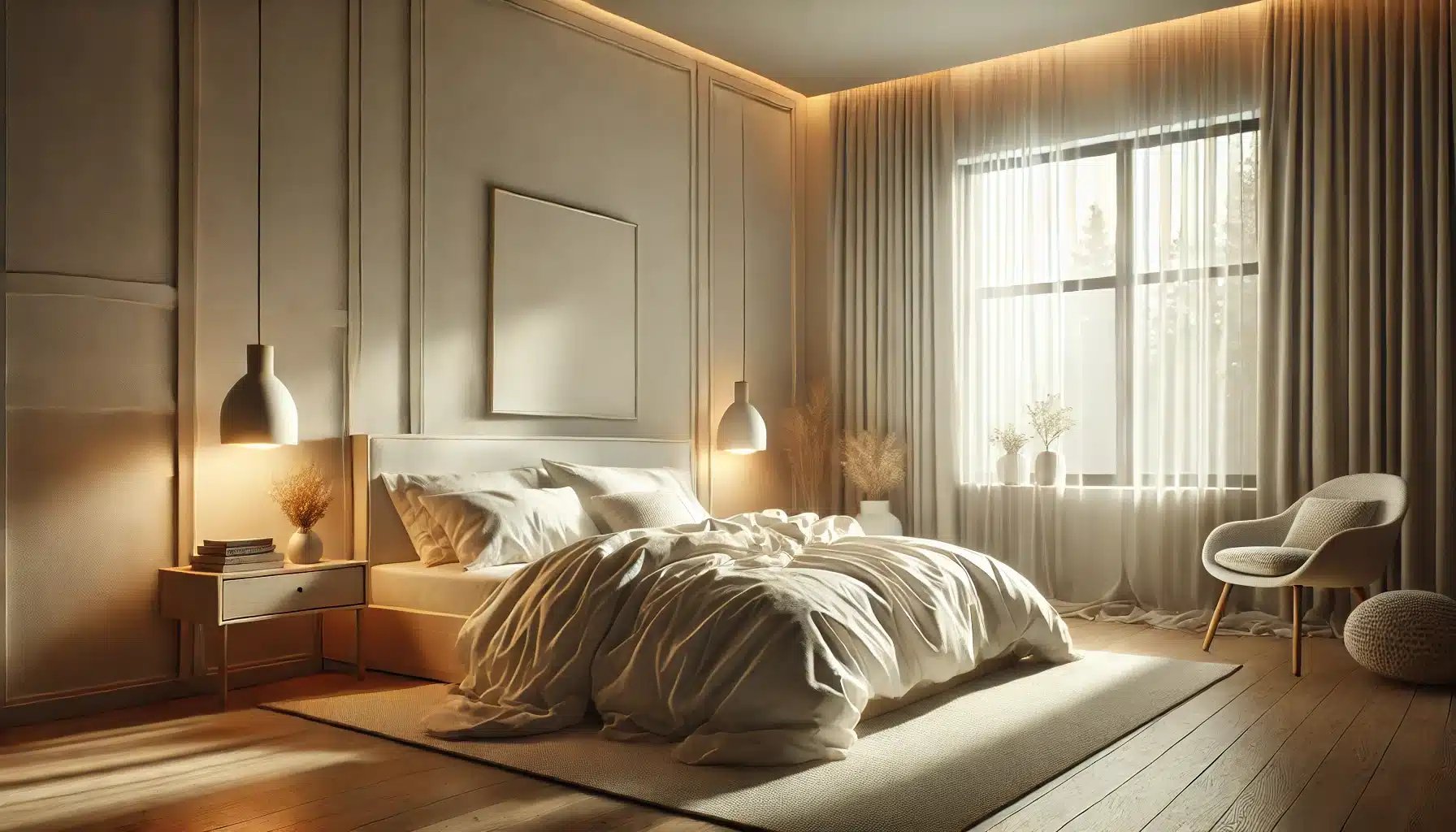
How to Build an Evening Routine That Prioritizes Rest
An excellent evening routine doesn’t have to be complicated. I used to think it meant a long checklist of relaxing activities, but it’s about consistency. Start by setting a bedtime and working backward to create a calming wind-down period. That means dimming the lights, sipping some herbal tea, and reading a book (yes, the old-fashioned paper kind).
✨ Better Sleep Essentials: I love getting my bedtime teas and natural sleep aids from Thrive Market.
- Set a bedtime: Aim for the same sleep and wake times every day, even on weekends.
- Create a wind-down ritual: Try stretching, journaling, or meditation to signal your body that it’s time to rest.
- Avoid heavy meals or caffeine: Give your body time to digest and relax before sleep.
Starting small 30 minutes of intentional wind-down time can make a huge difference.
Importance of Light Exposure and Circadian Rhythm Alignment
Light plays a massive role in regulating your circadian rhythm, which is your body’s internal clock. Exposure to natural light in the morning helps you feel alert and sets the stage for better sleep at night. On the flip side, dimming the lights in the evening tells your brain it’s time to wind down. I started taking a quick walk outside each morning, and not only did it improve my energy during the day, but my sleep improved, too.
- Morning light: Get 10-15 minutes of sunlight within an hour of waking.
- Evening dimming: Reduce bright lights at least an hour before bed.
- Support your rhythm: Stick to consistent wake and sleep times to keep your clock in sync.
Managing Screen Time and Blue Light Before Bed
If you’re like me, you’ve probably spent countless nights scrolling on your phone, telling yourself, “Just one more video.” But blue light from screens tricks your brain into thinking it’s still daytime, suppressing melatonin, the hormone that makes you sleepy. I set my phone to night mode after 8 p.m. and kept it out of reach during my wind-down routine. It’s not always easy, but it’s worth it.

- Use blue light filters: Most devices have a night mode or blue light blocker; use it after sunset.
- Set screen limits: Try cutting off screen time 1-2 hours before bed.
- Find alternatives: Replace late-night scrolling with reading, journaling, or listening to relaxing music.
Creating a longevity-focused sleep routine doesn’t have to be overwhelming. It’s all about small, consistent steps that help your body and mind prepare for rest. Prioritize light exposure, minimize screens, and craft a wind-down routine that works for you. Before you know it, you’ll sleep better, feel sharper, and set yourself up for a longer, healthier life. Give it a try tonight!
Ready to optimize your sleep naturally?
Stock up on sleep-supporting essentials from Thrive Market.
👉 Get 30% off your first order here
Conclusion
Quality sleep isn’t just about feeling refreshed. It’s a cornerstone of living a longer, healthier life. Sleep plays a critical role in everything from repairing your body to protecting your mind, and it’s one of the simplest ways to invest in your long-term health. By adopting these evidence-based strategies, like creating a consistent routine, managing stress, and optimizing your environment, you can set yourself up for better sleep and, in turn, greater vitality and longevity.
Remember, it doesn’t take an overnight overhaul. Start small maybe dim the lights an hour earlier tonight, or try a quick breathing exercise before bed. Each step you take builds on the last, creating habits that improve your sleep and support your overall well-being. Prioritize your rest, and you’ll be amazed at how much better you feel now and in the years to come. The path to a healthier, longer life begins with a good night’s sleep.
🌙 Better sleep is just one part of the puzzle. If you’re ready to boost your energy, improve mental clarity, and build healthier daily habits…
👉 Grab my FREE 3-Day Life Reset a simple, science-backed plan to help you recharge with plant-based meals, mindful routines, and better sleep practices.
Note: This guide is for informational purposes only. Always consult with healthcare professionals before making significant dietary changes or starting new supplement regimens.






